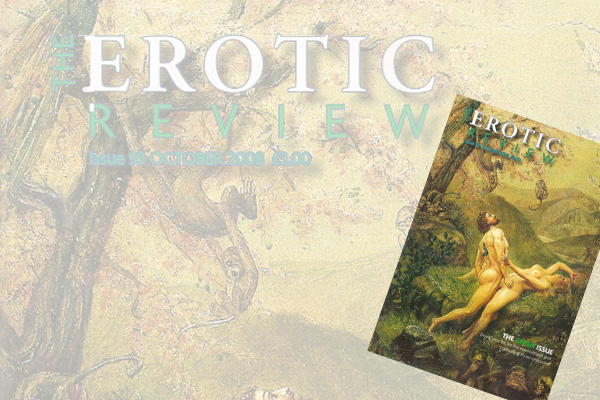Slow Sex

The environmental movement has long thought that the answer to many of our societal ills is simply to slow down. We already have slow food, slow cities, slow travel. Pat Thomas suggests that it’s time for slow sex.
In my days as a therapist, I once sat in a room full of women and my co-facilitator and I asked a seemingly, absurdly simple question: ‘what is the purpose of sex?’
There were a few guffaws, a bit of embarrassed silence, I think someone even blurted out ‘what a ridiculous question!’. A few amongst the workshop attendees grappled with incomplete thoughts and unfinished sentences. We never did get an answer.
Sex, like the environment, is a big subject. And, like our interactions with the environment, the way we relate sexually with others is often individual and personal. In the same way that words can fail and limit us when we gaze upon the beauty of nature, or try to describe the connectedness of all natural systems, they can fail and limit us when we try to articulate the power and the beauty of sex. And often, because it is difficult to articulate, we stop trying, or resort to habit, platitude and caricature, before flinging our clothes off and hoping for the best.
Yet that essential existential question remains, and becomes even more intriguing when we start linking sex and environment and posing other questions such as: ‘Is the way we relate to each other reflected in the way we relate to the natural environment?’
Environmentalists are typically seen as asexual, or at the very least too consumed with a passion for saving the planet to have much of a view on sex. Sure there has been a small flurry of green commodification in the form of hemp and silk knickers, petroleum-free lube, Fairtrade latex condoms, vegan friendly bondage gear and even FSC certified wooden paddles.
Some recent magazine articles have offered perfunctory ‘eco sex’ tips; bullet point thinking about showering with a friend, or foregoing lights in favour of beeswax candles, or oiling the wheels with some organic wine before getting down to it.
There is also a smattering of eco-sexploitation on the web on websites like fuckforforest.com and vegporn.com.
But in the main, environmental discourse avoids sex unless it is to do with reproduction and the way that man-made industrial pollutants, particularly hormone mimics, are interfering with it. Environmentalists themselves, gun shy from years of media cynicism and corporate spin, remain pretty much silent on the nuts and bolts of what sex means to them as part of the totality of their lives.
This, then, is a personal view. It comes from an ‘environmentalist’, but maybe more crucially from someone who thinks that writing and fucking are two of the more noble forms of human intercourse. Someone who believes that both these forms of relatedness have somewhat lost their way, lost their soul purpose, in recent decades, but who also believes in the inherent power of both to act as a catalyst for transformation-Awkward questions
Environmentalists – at least the good ones – ask a lot of awkward questions. It’s one of our most annoying habits and one of the reasons that we don’t get invited to parties much. These days there are a lot of questions to ask; ecological, social, moral, aesthetic, practical, ethical, political and even metaphysical questions.
‘Big picture’ questions that should be addressed to any and every trend, technology or ideology, in order to (hopefully) help us understand a thing from the inside out and keep us from making the same stupid mistakes over and over again. Imagine if we applied some of these types of questions to modern sexual culture:
- Does it preserve or destroy diversity?
- How much and what kind of waste does it produce?
- How does it affect our perception of our needs?
- How does it affect our way of seeing and experiencing the world?
- To what extent does it distort or redefine reality?
- What values does it foster?
- What is gained – or lost?
- Is it beautiful – or ugly?
- Does it express love – or rage?
- What is its mystique?
- What aspects of the inner self does it reflect?
- Does it concentrate or equalise power?
- Does it promote wholeness or fragmentation?
- How does it enlighten us?
- What does it allow us to ignore?
Aspiring to this level of awareness isn’t simply a new age conceit. Dust off your copy of the Kama Sutra – ignore the pictures and the fact that it was intended for the wealthy urban male with hot and cold running courtesans. Re-read the opening chapters and you will find some valuable psychological insights alongside the instructions to develop your mind, your career, your interpersonal skills, your compassion and your philosophy of life before you can start tracing a path to sexual fulfilment. In other words, for sex to be a complete experience the people involved must be complete – or at least committed to the process of becoming complete.
The fragmented self
Contrast this with the picture of modern sexual culture. Start with the words we usually see and hear connected to sex: scandal, abuse, dysfunction, perversion, inadequacy, predator, disease. The near daily onslaught in the media leaves us in no doubt; even if sex has no purpose, it definitely has consequences.
Compare these words to those that most of us would like to see juxtaposed with sex: intimacy, connectedness, liberation, passion, pleasure, tenderness, spirituality, soul, satisfaction, surrender, warmth, love.
That many see sex as something less than noble, as a problem to be solved, as just another demand to tick off the ‘to do’ list, has a lot to do with how fragmented and disempowered we have become as individuals. This, in turn, has a lot to do with the globalised and consumer driven culture in which we live.
Globalisation affects every level of our lives, economically, politically, socially and even sexually. It breaks down barriers, to be sure. But that breakdown comes at a price. The same culture that poisons our environment is also toxic to our minds and emotions – the very tools we need in order to relate successfully to others.
In a post-modern globalised world nothing is sacred, everything is for sale and the market rules. Community breaks down. Identity – on a national, local and individual level – is eroded. Our ability to find a deeper meaning in things becomes flabby. We become rootless, weightless and valueless.
Our aspirations become narrow, our sense of powerlessness runs deep. We feel less in the midst of such apparent abundance.
The very human need for connectedness and identity makes fragmented people easy prey for vested interests – politicians, marketeers, pharmaceutical companies, ‘sexperts’, hucksters of every variety, even the green kind.
In a world where everyone has something to sell we learn more of what we know from commercials than we do from books or from each other. If we want to be connected we get broadband and a mobile phone. If we want to be seen we get a page on Facebook. Increasingly we derive our notions of who we are, not from our families or from what is inside of us, but from trusted brands -because we’re worth it.
The sales spiel may tell us that the visual vindaloo of modern sex – the PVC dildos, silicone breasts, latex faux vaginas, coloured, perfumed and flavoured condoms, feathered handcuffs, Velcro fastening ankle straps and the endless array of naughty underwear and costumes that pass for eroticism these days – sets us free. They are, we are told, a giant leap forward from the puritanical attitudes of the past.
In reality the more, better, longer, bigger, faster, hotter, wetter and harder of modern sexual culture is just the flipside of the puritanical coin. It is designed to take us from arousal to orgasm in minutes without all those messy, complicated feelings that come in between (and before… and after). It imprisons us in the belief that we are nothing but physical beings and sex is nothing but a physical act.
It’s market driven drivel, of course. But such is the longing to feel something – anything – that some of us have lost sight of the idea that whole person sex in a whole person world might look very different indeed.
Slowing down
I think it was Mae West who once said: ‘Anything worth doing is worth doing slowly.’ Well, out of the mouths of vamps.
Within the environmental movement the philosophical and practical answer to many of our social and cultural ills is simply to slow down, to get closer, to be smaller, to find a natural rhythm that fits our needs, our lives, our desires. The need to find an antidote to our superfast, supersize culture has led to a variety of ‘slow movements’: slow food, slow water, slow cities, slow travel, slow design, slow thinking and – perhaps inevitably – slow sex.
Far from being puritanical, it is a progressive, forward-looking, humane approach to intimate relationships, open to those of all sexual persuasions. It’s the emotional equivalent of going organic, getting off the grid and stepping off the global treadmill.
By slowing down we are able to enjoy and prioritise many aspects of our lives. The emphasis is on sensation and emotion, and the ‘goal’ is deep connection rather than superficial thrills and there is little else like it being practiced in the West.
Tantra comes close, with its focus on the senses and its emphasis on the journey rather than the destination, but it also comes with a lot of spiritual baggage. In particular, the older you get the less attractive that kind of prescriptive spirituality gets; you just want the fucking without all the fucking nonsense.
With slow sex, fucking by the clock with your mobile phone on the bedside table is out, while the joy of anticipation is in. It doesn’t require a lot of gadgets and aims to nurture, rather than deplete, the individuals involved. It also equalises power in the bedroom. In market driven sex we are either performers or spectators. With slow sex both partners are participants and sustainability – that is, building a relationship with someone cultivated over time, allowed to age, evolve, mature, to become more complex – is celebrated.
Not long ago, a global survey found that those couples who are most fulfilled and happy with their sex lives are those who whose relationships are based on equality rather than the will to dominate. In this context sexual pleasure and orgasm aren’t something that one partner bestows upon another but are instead part of a shared journey.
Slow sex can be hot, engaging and satisfying. But it is also real, and most decidedly for grown-ups – the ones ready to deal with the fact that the only place where sex is always great is on TV or in the movies or on internet sites streaming 24/7 porn.
In a real relationship sex isn’t always easy, or good or glamorous. If it was we’d all be getting it right all the time and the market would disappear up its own tired and sore backside.
At its most basic level slow sex connects us to each other. It recognises that good sex is dependent on a complex mixture of things: the mental state of the people involved, their health, their ability to acknowledge their needs, desires and emotions, their level of intimacy and maturity, as well as the ambiance in the room, its temperature, its sounds, its smells and tastes.
At its most ambitious is an acknowledgement of the interconnectivity of our sexual natures and the wider natural environment. As a guideline for living, the premise of a ‘deep ecology’ is as valid in the bedroom as it is on the savannah, the rainforest or the wetlands. How we relate to each other and to ourselves directly influences how we relate to the world. How we treat our bodies is reflected in how we treat the environment.
Indeed if sex has a purpose, beyond procreation, it is to connect us to something bigger than ourselves, to remind us that we are a part of nature, that we are powerful and fragile, fleeting and eternal, utterly flawed and completely perfect.
The philosophy and practice of slow sex as a pathway to fulfilling eroticism is a substantial and lasting undertaking. It makes us better people, it has the potential to make the world a better place. And it’s so much more valuable, and less embarrassing, to pass on to our children than a jelly spiked dildo or a plastic twat.
- Pat Thomas is editor of The Ecologist magazine and a qualified, but non-practising, psychotherapist.
- This article appeared in the October 2008 edition of the Erotic Review












